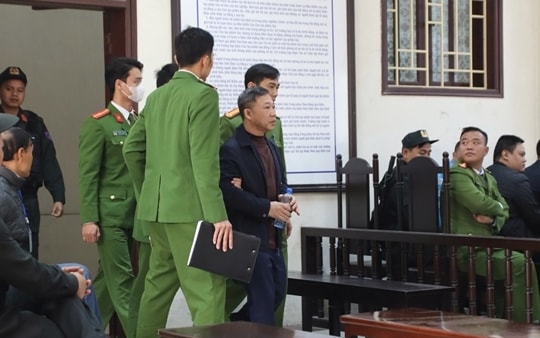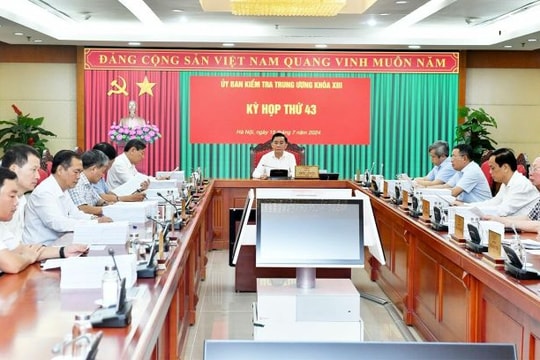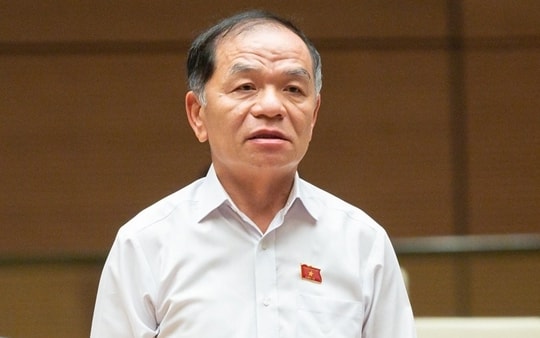'Legal cover' for corrupt assets?
Will imposing a 45% tax on the assets and incomes of public officials that are not truthfully declared give corrupt assets a "legal" stamp?
Dr. Le Thanh Van, Standing Member of the National Assembly's Finance and Budget Committee, had a discussion about the regulation to collect 45% of assets and incomes that are not truthfully declared by civil servants, which has just been added to the draft Law on Anti-Corruption (amended).
The Government has just proposed to include a provision on collecting personal income tax at the rate of 45% for assets and income of unknown origin and dishonest declaration in the draft revised Law on Anti-Corruption. Public opinion is very concerned about the basis for the above proposal. Can you share your personal opinion on this?
- It can be seen that one of the biggest limitations of the current Anti-Corruption Law is that we do not have a strong enough tool to control the assets of officials and civil servants. Recently, public opinion has been stirred up about the large assets of officials and suspected that they originated from corruption. However, proving the origin of these assets is not easy, because current regulations have not created the ability to control dishonest behavior in declaring assets of officials and civil servants.
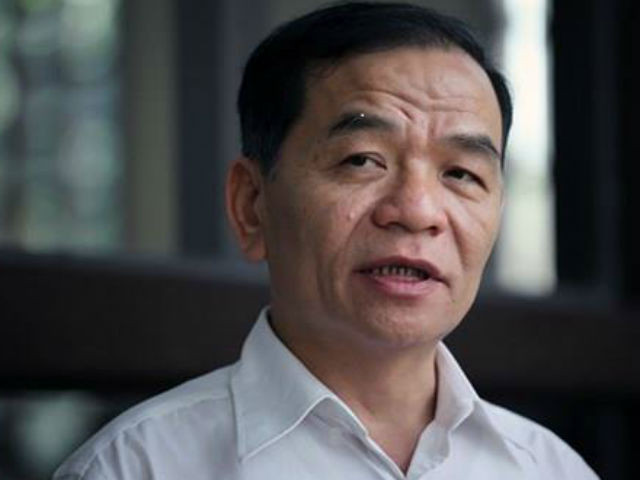
Dr. Le Thanh Van - Standing Member of the National Assembly's Finance and Budget Committee (Photo: LU)
According to the Government's report to the National Assembly at the Fourth Session at the end of 2017, the recovery of corrupt assets is extremely difficult because corrupt subjects have spent, dispersed assets, and transformed corrupt assets into assets owned by relatives and acquaintances.
Meanwhile, the law does not have a feasible recovery mechanism, in other words, it is still "stuck horizontally and vertically". Not counting the assets that have not been discovered, only a part of the assets that have been discovered have been recovered.
Currently, the only way to recover corrupt assets is through a criminal judgment, after proving the corrupt behavior and the convicted person's assets are determined to have originated from that behavior. In many cases where civil servants are accused of having "huge assets", proving through this form is almost impossible. That is the reason why the recovery of corrupt assets in the past has been almost insignificant.
Perhaps stemming from the viewpoint that "there must be some regulation to recover as much as possible", the proposal to impose a 45% tax on assets of unknown origin, or to explain unreasonable increases in assets and income, has been proposed in this draft revised Law on Anti-Corruption.
Many opinions expressed concern that, with this regulation, the fight against corruption will be "half-hearted" when the Law has implicitly acknowledged "dishonestly declared assets" - unclear assets are legal, only subject to tax collection?
- I believe that incomplete or dishonest declaration does not mean that the assets are illegal. Tax collection does not mean "stamping" or legalizing the hidden assets.
In essence, there are two possibilities for dishonest declaration: The first possibility is that the declarant wants to conceal income and assets so as not to increase his/her profile, in order to avoid scrutiny when there is a chance of promotion; or it is also possible that the income and assets have not completed legal procedures or have not paid taxes. The second possibility is that the income and assets are concealed because of corruption or because of violations of the law that have not been discovered.
If taxation legitimizes crime or corruption, even if the tax rate is doubled as proposed, the offender or corrupt person still benefits.
Therefore, in this situation, the property must be confiscated and the person concerned must be dealt with according to the law. Anyone who assists in the legalization of such income and assets (such as signing a loan contract, forging a loan contract, etc.) will be considered an accomplice.
Obviously, if there is sufficient basis to determine the nature of the above declaration, with the first possibility, the tax collection (instead of taxing as proposed at 45%) is completely correct and administrative discipline can be applied for dishonest behavior.
The second possibility is that taxation is a legitimization of illegal or corrupt behavior, even if the proposed tax rate is doubled, the illegal or corrupt person still benefits.
Therefore, in this situation, the property must be confiscated and the person concerned must be dealt with according to the law. Anyone who assists in the legalization of such income and assets (such as signing a loan contract, forging a loan contract, etc.) will be considered an accomplice.
So the regulation on collecting 45% tax on unclear assets and income is unreasonable and not really effective in preventing fraud in asset declaration of officials and civil servants, sir?
- Taxation can be considered a feasible measure and can also be considered a "special" tax. Let's temporarily consider it as hidden income, which in principle must be declared and taxed, and if discovered, must be collected.
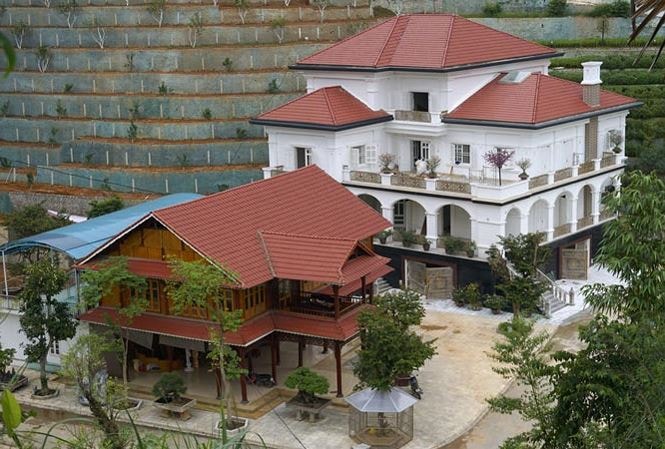
The illegally built mansion of Mr. Pham Sy Quy, Director of the Department of Natural Resources and Environment of Yen Bai province (Photo: N.Minh)
However, I am also concerned about the 45% tax rate on assets, because I do not know what basis they use to set that tax rate. If it is a tax rate, there must be a common level, according to tax law. If it is a special tax rate, there must be a clear basis and a document that regulates it. If there is a penalty, there must be a clear legal basis.
In addition, the question must be raised: is there any similarity between legally acquired assets and corrupt assets or assets obtained through corruption? Are undeclared, unreported, and unexplained assets all considered illegal income? Which agency determines the legality of assets, the court or the anti-corruption agency? And what method is used to determine the true nature?
- Is it possible to confiscate unexplained assets to pay into the budget? Who, which agency will be responsible for suing to claim corrupt assets for the State and what mechanism will be used to handle and recover assets? Taxing assets and whether the tax rate is appropriate in the context of anti-corruption or not are all issues that need a comprehensive, scientific and convincing explanation.
As you said, the biggest loophole of the current Anti-Corruption Law is that it does not have a strong enough tool to control the assets of civil servants, especially to recover the assets of corrupt people. From the perspective of a law maker, what provisions do you think need to be added to overcome this limitation?
- Of course, we should not expect that the Anti-Corruption Law will solve everything, because this is only a framework law. Besides, there are many other very important laws such as the tax law, the non-cash project, laws related to detection and handling mechanisms such as inspection, auditing, investigation, and mechanisms to promote the supervisory role of people, press agencies and society... Therefore, imposing a 45% tax on assets and income that are not declared or unreasonably explained is only a preventive and deterrent measure, but the root of it is that we must manage the source of income.
I think that the most fundamental thing is to have clearer regulations on asset declaration. Last year, the Politburo issued regulations to inspect and supervise the asset declaration of about 1,000 officials under the management of the Politburo and the Secretariat. This is a very important regulation, ensuring transparency and openness, and is the basis for people to monitor the assets of officials.
On the other hand, the role of media and social networks cannot be ignored. The cases of income and asset declarations discovered in recent times were mainly made through this information channel.
In fact, to conduct an inspection, it is partly based on the declaration of the inspected subject, but more importantly, it is necessary to rely on the people and the press to clarify.
There are assets transferred to children, parents, and siblings without a clear origin, so how can we handle them? The father is an official, the child has just returned from studying abroad and owns a billion-dollar villa, luxury car... so where did those assets come from?
- If there are no measures to force the explanation of the origin of assets and to handle assets of unclear origin, then the effectiveness of asset monitoring and control is questionable.
Therefore, we expect the National Assembly to soon amend and supplement legal provisions and look forward to the effectiveness of the Party's strong measures.
I support our Party's application of special measures to severely punish corrupt officials. First of all, we need to focus on clarifying a number of cases and individuals that the public and people have raised questions about.
Thank you!

